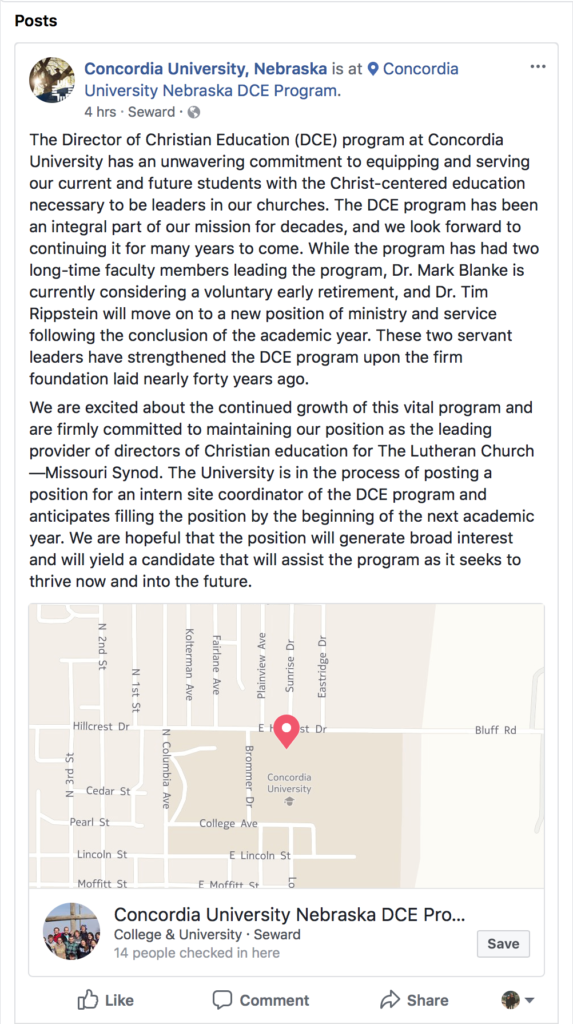Budget Cuts Create Concern for Churchwork Programs
by Kimberly Sleeper
Budget cuts affecting faculty and academic programs have led to the spread of concern and rumors across Concordia’s campus.
The Director of Christian Education (DCE) Program has appeared to be most affected by the budget cuts.
Rumors began circulating shortly after Spring Break in the third week of March. The DCE Program held a meeting with their students on March 20 to address the concerns and rumors. It was reported in the meeting that DCE Program Director Dr. Mark Blanke has been offered a voluntary retirement. It was also reported that Assistant Professor and Internship Site Director Dr. Tim Rippstein’s faculty contract was not renewed for the 2018-2019 academic year.
Many students in the DCE Program felt the program was being targeted and that Concordia no longer valued the program.
Concordia posted about the issue on their Facebook page.

Comments on the post ranged from anger to encouraging outreach to Blanke and Rippstein. Lydia Farrar, a senior in the DCE Program, commented,
“As a current student, I’m disappointed in the choices of CUNE. An early retirement offering cannot be aimed at one person, but not renewing the contract of Tim Rippstein at the same time was a very poor decision. Your actions speak louder than words, and this sends a message to the rest of (the Lutheran Church—Missouri) Synod that the DCE program is no longer supported as fully as other programs. The very reason I came to this school was for this program, and truthfully, the church work programs are the only thing that make Concordia unique from all other private (u)niversities.”

Blanke explained the circumstances of his early retirement offer through a comment on the “Concordia University Nebraska DCE Program” Facebook page.
“My early retirement offer was given to all senior faculty who met certain age and length of service qualifications. It was NOT an attempt to diminish the DCE Program,” Blanke said.
President Brian Friedrich also spoke on the matter.
Friedrich explained that Concordia’s budget can be split into four separate categories: 47 percent goes to salaries, including those of student workers; 43 percent goes toward operations such as electricity and HVAC; eight percent is used for depreciation of facilities on campus; and two percent is allocated for paying interest toward loans the university has taken out to build or remodel buildings on campus.
“(The portions set aside for depreciation and loan interest) are, in many ways, fixed costs. We can’t change those,” Friedrich said.
The ninety percent of the budget used for salaries and operations, is, according to Friedrich, more flexible.
This year’s budget cuts round up to roughly $1.5 million. Friedrich said the cuts must be “repeatable” and “sustainable” because the university has struggled with repaying that specific amount for multiple years
To date, the University has figured out how to save $700,000 of that debt, leaving roughly $800,000 to be allocated for.
This $700,000 in savings has come from several cuts, from investing less money in professional conferences for faculty and staff to reducing the mileage reimbursement faculty and staff receive if they drive their personal vehicle for university business.
Discussion of eliminating faculty and staff positions led to much of the concern voiced by students and other members of the Concordia community.
Friedrich said that 19 positions need to be eliminated to be within the confines of the new budget. He offered three options for how the university can address this problem. The first option is not filling certain open positions. The second option involves shuffling faculty to fulfill different roles in their own departments and eliminating secondary positions
“The third way, and always the most difficult way, is when we have to eliminate a position where a person is working or serving in that position. Those are the hardest ones,” Friedrich said.
By combining, eliminating or not filling certain positions, Concordia has eliminated 11.45 full-time positions to date.
Concordia offered 15 faculty members a voluntary Early Retirement Offer (ERO) on March 1. An institution who offers an ERO legally cannot discriminate in who receives the offer and is required to specify a “class” of individuals who will receive the ERO.
Concordia considered the factors of years of service and chronological age when specifying the “class” of faculty members who would receive EROs. If these two factors equaled 75 years or more, the full-time faculty member fell under the “class” and was offered the voluntary ERO.
Friedrich said EROs are completely voluntary, giving the recipient a chance to decide whether he or she wishes to take the offer.
“(Once the offer is made), the university has to step back, and the decision is 100 percent in the hands of the person that receives (the ERO),” Friedrich said.
The EROs could be beneficial to faculty who have recently considered retirement. Friedrich said that Concordia views the voluntary ERO as a more “grace-filled” option for eliminating positions for money-saving purposes instead of removing specific faculty members from their positions.
If enough faculty members do not accept their voluntary EROs, the university will need to step back to evaluate its remaining options. Friedrich said re-evaluating the options will have the university ask, “Which of these options will help us to best serve today and for the future?”
Friedrich said that faculty positions may still be cut after this but that it would not be the university’s first choice to forcefully eliminate full-time faculty.
Friedrich also offered his “personal commitment” to the DCE Program, saying it is a “key program” at Concordia.
Friedrich also said that new faculty members have the ability to look at the University’s existing programs in a new light, offering exciting, new ideas.
“That is part of, I think, God’s plan for this place,” Friedrich said. “Time after time after time, I have seen how God has blessed this place with just the person we needed, at just the time, with just the gifts, skills and abilities.”
Faculty who were offered the voluntary ERO have until April 20 to decide.
Concordia’s Student Senate will be hosting a forum between students, President Friedrich and his cabinet on Monday, March 26, at 6 p.m. in the Thom Auditorium. All are welcome to attend.














